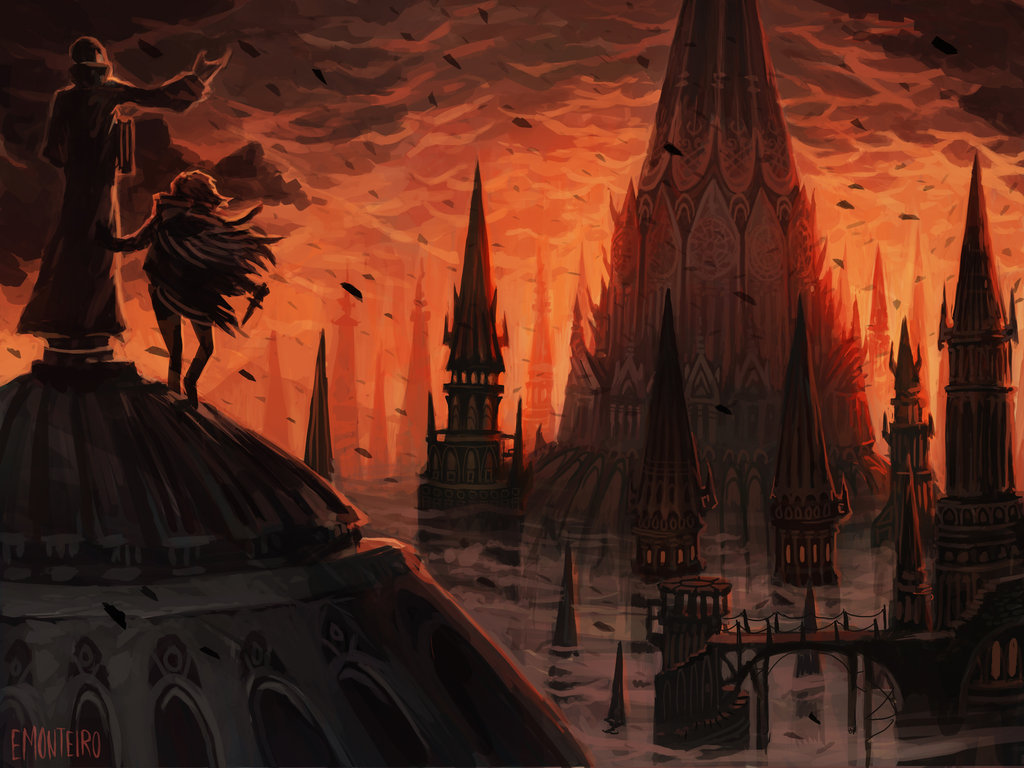While I’m on vacation in Ireland, I’ve invited Unequally Yoked readers to assemble a wunderkammer of guest posts on books, practices, ideas, etc that particularly delight them. Claire began this series with her post on prayers following communion, K.Chen followed on the virtues of YouTube covers, and the next entry is from Ben Conroy, a columnist at The Irish Catholic and an aspiring fantasy author.

Anyone observing the human race for any length of time would very quickly conclude that most people are far more easily swayed by stories than by arguments. As Terry Pratchett says in Witches Abroad: “People think that stories are shaped by people. In fact, it’s the other way around.”
When trying to convince another of your viewpoint, there are few more powerful methods than storytelling.
And one need look no further than this very blog to see that fiction can serve as a powerful means of communication. Why discuss forgiveness, or mercy, or criminal justice in the abstract, when you can talk about the great and terrible Inspector Javert?
In the hands of a propagandist, stories can be reduced to merely this – particularly effective tools of persuasion. But truly great stories have a quality that resists instrumental use: the same work of narrative art can strike a chord with people of very different worldviews.
This has rarely been more obvious to me than with Brandon Sanderson’s Mistborn fantasy trilogy. It’s set in a world in which “The Dark Lord won” – where the villain long ago defeated the Legendary Hero, and set himself up as a god complete with the world domination that so many fantasy antagonists vainly seek. Its protagonists are a gang of thieves, hoping to defeat the Lord Ruler not by fulfilling an ancient prophecy, but by making him the victim of a most audacious con.
The books are among my favourites. They have a fantastic magic system with enough limitations to make its use in solving problems satisfying rather than eye-rolling, a genuinely original setting and plot, and unforgettable characters.
But they also resonated on a deeper level. The trilogy meditates on effective leadership, the importance of trust – sometimes even in the untrustworthy – and on human nature. Many modern fantasy authors create morally complex worlds by making virtually every character at least a little depraved – but Sanderson is more of a stealth Thomist. His villains tend to do terrible things in the pursuit of goods, real or apparent. (He once wrote that the Mistborn trilogy has only one unambiguously evil character).
The books also explore questions of faith. One character, Sazed, is a kind of historian of religion, trying to re-discover the different belief systems that existed before the Lord Ruler’s victory. His doubts and struggles are vital to the story, but his questions about the nature of religious truth in Sanderson’s world have actual answers – ones I found fascinating.
It would be easy to say that these themes chime so much with me because, as a Catholic, I share a lot of priors with the practicing Mormon Sanderson. Yet my girlfriend, an atheist, loves the books just as much as I do – and not despite their themes, but in part because of them.
It’s not the only example of this: when she introduced me to The Grapes of Wrath, I not only thought the book was great but particularly enjoyed Reverend Casy, even though much of his message is antithetical to organized religion.
We were both bowled over by John Michael McDonagh’s film Calvary – I, because I saw it as a quintessentially Catholic tale, reflecting the myth of sacrifice and redemption woven into the fabric of reality, and she because it affirmed the value of doing right regardless of ultimate consequences.
This is hardly unusual. Calah Alexander can praise Joss Whedon, (who once described the biblical God as a “cosmic bully”) as “basically a modern-day Dante”; and Neil Gaiman, who said that the existence of God “doesn’t really matter to me” can call Chesterton’s The Man Who Was Thursday a “theological delight.”
The common thread is, simply, excellence. My girlfriend and I were only touched by the themes after we had first fallen in love with the stories. Mistborn, Grapes of Wrath and Calvary are great. Their worlds are well worth spending time in.
In trying to tell true stories, the best storytellers can’t help but be inspired by the things they believe to be most true, by their fundamental beliefs. But if they focus on trying to make a point or argument rather than on the story itself, they’re paradoxically less likely to communicate anything about their worldview to anyone who doesn’t already agree with them – and their story will be less likely to really resonate even with those who do.
It’s the difference that Tolkien identified between allegory and “sub-creation”, and why he was ultimately unsatisfied with the former.
The more a book reflects something true about human existence, the more its world seems like a real place with characters who live and breathe; the more likely it will be to speak to people regardless of creed; to get atheists, Christians, Buddhists and Muslims experiencing that thrill of recognition, nodding and saying, “That feels right.”
Final explanations for why this is can only be sought within our worldviews, paradigms and religions. To me, the way these truths about human nature universally resonate seems to point towards one, underlying, ultimate Truth.
But then, I would say that.
Leah again: Well, I’ll confess my interest piqued about checking The Final Empire out of the library once I’m stateside again. This was a fun guest post to put up as I’ve just finished reading Christine Falls as part of my Ireland-themed travel reading. The book was certainly, certifiably excellent (the author has won the Man Booker, though not for this novel), but I found it extremely frustrating. For a mystery, it seemed to move along by happenstance, without a particularly driven or attentive investigator. Although the writing was skilled, the world felt small and flat, in a way that, say, Pratchett does not. (Not because of all the madness of Discworld but because the characters are active and it feels like everyone is living a full life outside of their relevance to the protagonist). But I also just have an animus against reactive protagonists, hence not liking The Goldfinch.












